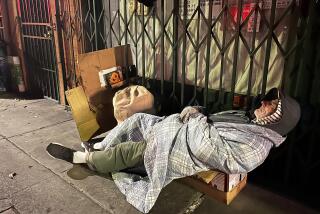Caltrans Can’t Choose Banners, Court Rules
Caltrans violated the 1st Amendment when it permitted American flags to be hung from freeway overpasses but not antiwar banners, the U.S. 9th Circuit Court of Appeals ruled unanimously on Thursday.
In its 3-0 decision, the San Francisco-based appeals court backed a federal district judge in San Jose who had issued an injunction against the California Department of Transportation policy last year.
“In the wake of terror, the message expressed by the flags flying on California’s highways has never held more meaning,” 9th Circuit Judge Kim M. Wardlaw wrote.
But she quickly added, “America, shielded by her very freedom, can stand strong against regimes that dictate their citizenry’s expression only by embracing her own sustaining liberty.”
The case arose out of a Caltrans policy prohibiting anything from being hung from overpasses because of safety concerns that banners or signs could fall or distract motorists.
After the Sept. 11 terrorist attacks, people throughout the state started hanging American flags from overpasses and the agency let them stay up.
However, when two young women from Santa Cruz hung banners two months later on California 17 highway overpasses questioning the U.S. invasion of Afghanistan, the banners were immediately removed -- in one instance by a local police officer and in another by a CHP officer. Both times, the officers left in place American flags on those same overpasses.
One of the removed banners asked, “Are You Buying This War?” The other read, “At What Cost?”
Although Caltrans officials did not remove the activists’ banners, they said they would have done so if they had seen them before the law enforcement officials took them down.
The two women, Cassandra Brown and Amy Courtney, both organic farmers, filed suit in federal court in San Jose and Judge Ronald M. Whyte issued the preliminary injunction saying Caltrans had violated the 1st Amendment.
Caltrans initially responded by saying it would permit all banners. But the agency quickly reversed itself and said it would permit no banners after a variety of antiwar and pro-marijuana banners were hung in various places in the state.
The agency also appealed the injunction to the 9th Circuit, contending that because Brown and Courtney had alternative means of expressing their antiwar sentiments, they could not demonstrate the “irreparable injury” required for an injunction.
The appeals court rejected that argument Thursday, holding that once Caltrans permitted the overpasses to become limited public forums by letting the flags stay up, the agency engaged in “unreasonable viewpoint discrimination” by barring other signs. Judges Dorothy W. Nelson, a Carter appointee, and Robert Beezer, a Reagan appointee, joined in the opinion by Wardlaw, a Clinton appointee.
“Caltrans’ safety justifications for its policy of prohibiting or requiring permits for expressive banners ... apply with equal force to flags,” Wardlaw wrote. “Allowing citizens to hang flags presents the same risk of falling objects that accompanies all other signs and banners.
“The record is devoid of evidence that flags are less prone to falling or are generally fastened more securely than other banners,” Wardlaw added.
The court also rejected Caltrans’ contention that the U.S. flag encompasses so many different views that it represents no viewpoint at all, quoting a 1989 Supreme Court decision: “The very purpose of a national flag is to serve as a symbol of our country; it is ... the one visible manifestation of 200 years of nationhood.”
“The reason the events of Sept. 11th evoked such a spontaneous proliferation of flags is precisely because of its message,” Wardlaw wrote. “Americans sought solace in the symbol of a nation joined in the effort to combat terror in the face of tragedy. Indeed, it is the potency of the flag’s message that makes Caltrans reluctant to remove it from California’s highways. In light of recent world events, that reluctance is laudable; however, the policy derived from it is not.”
Wardlaw emphasized that there was a clear distinction between a government agency, such as Caltrans, hanging a flag on one of its buildings or an overpass. That would be permissible speech by a government agency expressing a point of view, she said. But if the agency permits others to speak, such as people hanging American flags, then it has to allow opposing viewpoints.
Three leading constitutional law scholars -- liberal Erwin Chemerinsky of USC, moderate Jesse Choper of UC Berkeley and conservative Eugene Volokh of UCLA -- all said that the court’s decision Thursday was soundly grounded in prior Supreme Court rulings.
“The 9th Circuit is exactly right,” Chemerinsky said. “Once Caltrans opens up overpasses [to political messages], they can’t discriminate.”
Choper said it was clear that the agency had engaged in viewpoint discrimination.
Volokh said, “Even critics of the 9th Circuit would have to acknowledge this decision is quite plausible, given the Supreme Court position that there has to be viewpoint neutrality” in such situations.
“This is a great case about what democracy stands for,” said James Wheaton, an Oakland civil liberties attorney who represented the plaintiffs. “These kinds of cases act like a big national civics lesson about what the flag stands for.”
Plaintiff Courtney said: “This decision says that it is crucial for people to keep the 1st Amendment alive and to use it, particularly in times of trouble.”
Caltrans spokesman Dennis Trujillo said the agency has been complying with Judge Whyte’s injunction and would continue to do so while it contemplates whether to seek a rehearing before a larger panel of 9th Circuit judges or ask the U.S. Supreme Court to review the case.
More to Read
Sign up for Essential California
The most important California stories and recommendations in your inbox every morning.
You may occasionally receive promotional content from the Los Angeles Times.









